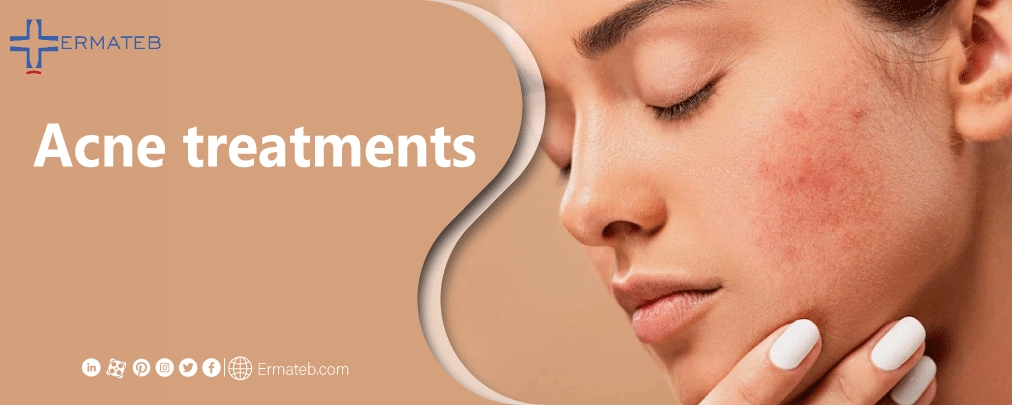
The type of treatment for acne depends on the severity of the acne. The treatment process can last several months to be improved. If you just have a few blackheads, whiteheads, and spots, you can be treated completely with over-the-counter gels or creams (topical treatments) that contain benzoyl peroxide.
Benzoyl peroxide is a type of antiseptic that reduces the number of bacterias on the surface of your skin. By reducing the bacterias on the skin surface, the number of whiteheads and blackheads will be less. Benzoyl peroxide has an anti-inflammatory effect. This is available as a cream or gel. Depending on your dermatologist's opinion you may need to use the gel once or twice a day. Try to apply it twenty minutes after washing all parts of your face so it will affect the acne. Applying too much of it or for a long time can irritate the skin. The time that you apply the Benzoyl peroxide your skin is sensitive to sunlight so you have to avoid the sun and ultraviolet light and wear sun cream. Avoid getting the cream on your hair or clothes because it has a bleaching effect. Possible side effects of benzoyl peroxide include:
_dry and tense skin
_a burning, itching, or stinging sensation
_some redness and peeling of the skin
Side effects are usually mild and should pass once the treatment has finished. Most patients need a 6-week course of treatment to clear most or all of their acne.
Topical retinoid functions for removing dead skin cells from the surface of the skin (exfoliating). This may help prevention of building up hair follicles. Tretinoin and adapalene are two topical retinoids that are used to treat acne. You can find them in a gel or cream type and then use them in your dermatologist's opinion (mostly once a day before going to bed and twenty minutes after washing the face). The time that you are treated with topical retinoids you have to avoid excessive exposure to sunlight and UV. Applying topical retinoids is not suggested during pregnancy because some risks may cause birth defects. Although severe side effects are rare, mild side effects like irritation and stinging are very possible.
Actually, a 6-week course of treatment is usually required, but you may be advised to continue using the medicine less frequently after this.
As it is clear from the name topical antibiotics are used to kill bacterias on the surface of the skin which may infect plugged hair follicles. You can find them in a lotion or gel type and then apply them once or twice a day depending on your doctor's suggestion.
Treatment duration of about 6- to 8-week is mostly recommended. After this, treatment is usually stopped, as there's a risk that the bacteria on your face could become resistant to the antibiotics. Antibiotic resistance can worsen your acne and cause additional infections.
Side effects are rare, but can include:
_minor irritation of the skin
_redness and burning of the skin
_peeling of the skin
Azelaic acid is mostly utilized as an alternative treatment for acne if the side effects of benzoyl peroxide or topical retinoids are particularly irritating or painful. Azelaic acid functions by getting rid of dead skin and killing bacterias. It's available as a cream or gel and is often applied twice a day (or once a day if your skin is particularly sensitive). This type of treatment does not make the skin sensitive to sunlight and UV, so you do not have to avoid excessive exposure to the sunlight. It is usually necessary to use azelaic acid for a month before your acne improves. The side effects of azelaic acid are usually mild and include:
_burning or stinging skin
_itchiness
_dry skin
_redness of the skin
Hormonal therapies can often benefit women with acne more than men, especially if the acne flares up around periods or is associated with hormonal conditions such as polycystic ovary syndrome (the time hormone levels are higher). If you do not already use it, a general practitioner might suggest the combined oral contraceptive pill, even if you're not sexually active. This combined pill can often help improve acne in women but may take up to a year before the full benefits are seen so the treatment duration lasts more than other treatments.
Isotretinoin is a treatment for severe acne which is available in capsules. It has a lot of beneficial effects including:
_it helps normalize sebum and reduce how much is produced
_it helps prevent follicles from becoming clogged
_it decreases the number of bacteria on the skin
_it reduces redness and swelling in and around spots
But this medication may also cause a wide range of side effects. It's only utilized for severe cases of acne that have no response to other types of treatments. Because of the various risk of side effects, isotretinoin can only be prescribed by a specialist doctor like a dermatologist.
Several acne treatments do not involve any medications. These include:
_comedone extractor :
a small pen-shaped instrument that can be used to clean out blackheads and whiteheads
_chemical peels :
where a chemical solution is applied to the face, causing the skin to peel off and new skin to replace it
_photodynamic therapy :
where light is applied to the skin with acne in an attempt to improve symptoms of it

